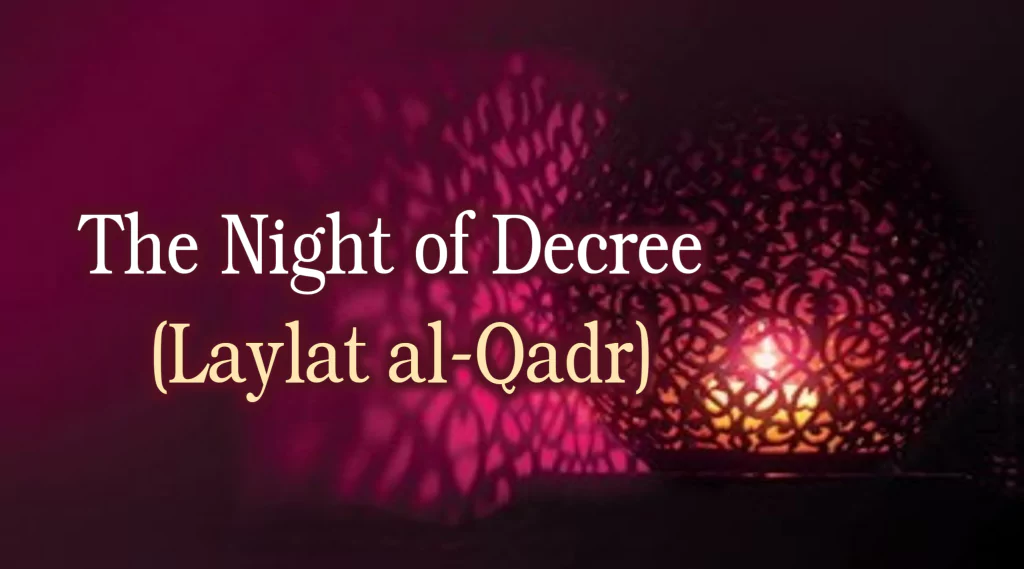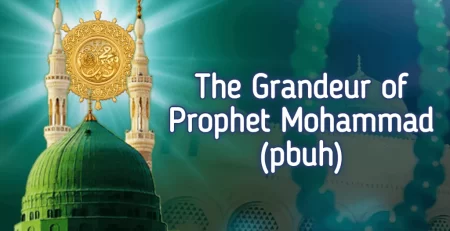Ramadan is to Achieve Piety
Fasting (Sawm) is a third fundamental principle of Islam. It became obligatory during the second year of migration (hijra) on the 10th of Shaban. The term Ramadan comes from the Arabic word ramd which means ‘to burn’. The dictionary meaning of ramd is siyam which means ‘to stop’ or ‘to relinquish’. In sharia it means to abstain from the desires of inciting innerself to Allah’s consent and pleasure. In this sacred month the reward of every righteous deed surge to seventy times.
Setting an Intention (Niyyah)
Setting an intention is the initiative of every act. Like other worships setting an intention before observing fast is a condition. A Hadith of the Holy Prophet Sall’ Allahu Alayhi Wa’alihi Wasallam states that actions depend on intentions. If one observes fast without establishing its intention, then his fast is not valid. In a second situation if one intended at night to observe fast but changed his mind in the morning, then his intention ends. He will have to make an intention again. Thirdly, if one intended to break his fast while observing it but didn’t break it then his fast remains and intention did not affect it.
Hafsa razi Allahu anhu narrates that Prophet Mohammad Sall’ Allahu Alayhi Wa’alihi Wasallam said:
“Whoever fails to set intention to fast before dawn, his fast is not considered.” (Al-Tirmazi-730)
Fasting is not vitiated by forgetful eating, deliberately holding vomit or vomiting accidently.
Allah says in Quran:
اُحِلَّ لَکُمۡ لَیۡلَۃَ الصِّیَامِ الرَّفَثُ اِلٰی نِسَآئِکُمۡ ؕ ہُنَّ لِبَاسٌ لَّکُمۡ وَ اَنۡتُمۡ لِبَاسٌ لَّہُنَّ ؕ عَلِمَ اللّٰہُ اَنَّکُمۡ کُنۡتُمۡ تَخۡتَانُوۡنَ اَنۡفُسَکُمۡ فَتَابَ عَلَیۡکُمۡ وَ عَفَا عَنۡکُمۡ ۚ (البقرہ۔ ۱۸۷)
Meaning: It is made lawful for you to approach your wives during the nights of the fasts. They are like clothes for you and you are like clothes for them. Allah knows that you broke the trust in the case of your own right. But He has shown mercy to you and has forgiven you. (Al-Baqarah 187)

Exemptions of Fast
The traveler and the sick can omit fast. Allah says in Quran:
اَیَّامًا مَّعۡدُوۡدٰتٍ ؕ فَمَنۡ کَانَ مِنۡکُمۡ مَّرِیۡضًا اَوۡ عَلٰی سَفَرٍ فَعِدَّۃٌ مِّنۡ اَیَّامٍ اُخَرَ ؕ وَ عَلَی الَّذِیۡنَ یُطِیۡقُوۡنَہٗ فِدۡیَۃٌ طَعَامُ مِسۡکِیۡنٍ ؕ فَمَنۡ تَطَوَّعَ خَیۡرًا فَہُوَ خَیۡرٌ لَّہٗ ؕ (البقرہ۔۱۸۴)
Meaning: (These are) a fixed number of days. So, whoever amongst you is ill or on a journey, then he shall complete fasting for the fixed number by (fasting on) other days. But those who are not able to fast, it is obligatory on them to provide food for a needy person in lieu of that. But whoever does (greater) good seeking pleasure, that is better for him. (Al-Baqarah 184)
Degrees of Fast
Imam Ghazali says:
There are three degrees of fast: fast of common people, fast of the special ones, fast of the most special ones.Fast of common people is to abstain from eating, drinking and engaging in sextual relations as specified earlier. This is the lowermost degree of fast.Fast of the most special ones is of highest degree. It involves getting rid of everything from inward besides Allah and submitting oneself to Allah completely. This means to fast extrinsically as well as intrinsically. One who engages in matters other than invocation of Allah breaks this fast. Even though contemplating on the matters of world is permissible but with that this fast breaks. However, a contemplation that helps in the progression of religion is excluded from it. Religious scholars are of the view that even if one plans about arranging sunset meal (iftar) during daytime then sins are written on his account, because this is an evidence of the fact that he does not believe in Allah’s promise to provide him sustenance. However, this is the level of prophets and the truthful. Not everyone can reach this level.
The fast of the special ones involves not only giving up eating, drinking and sextual activities but also protecting all the limbs from indecent activities. One accomplishes this fast is through six things.
Fasting of Sight (Safeguarding the Sight)
Fasting of sight is to guard eyes from things that turn away the inward from the remembrance of Allah. Particularly those that cause the urge of sensual desires because the Messenger of Allah said:
- Sight is a poisonous arch among one of the arches of Satan. Whoever guards it in fear of Allah, will be rewarded with such faith that he will feel its relish in his inward.
Anas relates that the Holy Prophet said:
- Five things break the fast, they are: lying, backbiting, faultfinding, false swearing, lustful gaze.
Fasting of Tongue
Fasting of tongue is to evade obscene speech and lewd talk. One should either stay occupied in invocation of Allah and recitation of Quran or keep quiet. Argument and fight are part of absurdity. According to some scholars backbiting and lying revoke even the fast of common people. It is narrated in Hadith that in the era of Prophet Mohammad two women kept fast and came closer to death due to thirst. They asked for the permission of Prophet Mohammad to break fast. Prophet Mohammad sent a bowl to them to vomit in it. They vomited clots of blood. People were staggered. Prophet Mohammad said: these two women kept fast from what is lawful and demolished fast from the things which Allah made unlawful, i.e. they talked malicious and this is the flesh of people which they ate.
Fasting of Ear
Fasting of ear is to abstain from listening to immoral talk. Because what is erroneous to talk is erroneous to listen as well. Listening to malicious speech is as big of a sin as talking malicious.
Fasting of Physical Organs
Protecting limbs from indecent acts is a fast of physical organs. A fasting person who involves his organs in evil acts is like a person who avoids sickness but eats toxic (i.e. While fasting he abstained from food but kept doing evil). Sin is a poison and food is nourishing but overeating is harmful. However moderate meal is not harmful. This is the reason Prophet Mohammad said many fasting people gain nothing from fast but hunger and thirst.
Avoid Eating Forbidden
While breaking fast avoid eating forbidden and ambiguous food. Refrain from overeating even the lawful. What is the benefit of fasting all day when one consumes double the amount while breaking fast? The purpose of fasting to get rid of desire of inciting innerself and eating twice the food increases the urge of sensual desires, especially when there is a vast variety of food. Inward cannot purify until the stomach remains full. In fact, it is a sunna of Holy Prophet to sleep less in the morning and stay awake to feel the effects of hunger and weakness. When sleeps early after eating less, he will be able to wake up early for tahajjud (voluntary night prayer).
Prophet Mohammad said:
No filled vessel is worse than stomach near Allah.
Remain Fearful of the Acceptance of Fast
After breaking fast, one should remain fearful of the acceptance of his fast. (Kimiya-e-Sa’adat)

♦ Fasting for a day in the month of Ramadan is more rewarding than fasting continuously for the remaining days of the year.
♦ In Ramadan the reward of every mandatory worship multiplies to seventy times. And the reward of every voluntary worship, seclusion, invocation and every good deed increases to seventy times to become equivalent to mandatory worships.
♦ There are ten rewards for reciting each letter in the Quran which increases to seventy times in Ramadan.
♦ The reward of even the smallest righteous deeds multiplies to seventy times even if it is removing a thorn from the path. Persuading the righteous deed is as rewarding as performing a righteous deed. Therefore, one should continuously persuade good deeds to gain the same rewards.
Fast is for Allah and He Rewards for it Himself
Allah says:
Fast is for me and I will reward it myself.
The question is why did Allah particularly declared to reward for fasting Himself when all other worships are for Him and He rewards for them all Himself? Mufti Ahmed Rayan Khan answers this to say there are two reasons. First there is an apprehension of show off in all other worships but there is no room for show off in fasting. One could eat or drink in solitude but does not infringe Allah’s order for His will. Secondly on the day of judgement the worships and rewards of the oppressor will be taken from him and given to the oppressed, but rewards of fasting will not be given to anyone. Allah will say that it was kept for Him and its reward will not be taken away from the fasting person.
Piety
Allah says in Quran:
یٰٓاَیُّھَا الَّذِیْنَ اٰمَنُوْا کُتِبَ عَلَیْکُمُ الصِّیَامُ کَمَا کُتِبَ عَلَی الَّذِیْنَ مِنْ قَبْلَکُمْ لَعَلَّکُمْ تَتَّقُوْنَ ( البقرہ ۔183)
Meaning: O believers! Fasting is prescribed for you as it was prescribed for the people before you so that you may become pious. (Al-Baqarah 183)
This verse provides evidence that the purpose of making fasts obligatory is to make Muslims pious. Prophet Mohammad Sall’ Allahu Alayhi Wa’alihi Wasallam says:
- The one among you who excels in piety is better than the other.
Piety is the Closeness of Inward to Allah
What is piety? The literal meaning of piety is abstinence. Once Prophet Mohammad was asked about piety. He pointed his finger towards his chest and said piety lies here. Piety or piousness is in fact the closeness of inward to Allah. The more one excels in piety the closer he becomes to Allah. That is, piety is another name for closeness to Allah.
Allah says in Quran:
ذَلِكَ الْكِتَابُ لاَ رَيْبَ فِيهِ هُدًى لِّلْمُتَّقِينَ (البقرہ۔۲)
Meaning: (This is) the Glorious Book in which there is no chance of doubt. (It is) a guide for those who guard against evil and fear Allah. (Al-Baqarah 2)
Understanding the true meaning of Quran is difficult without reaching the level of piety.
Allah says in Quran:
إِنَّ أَكْرَمَكُمْ عِندَ اللَّهِ أَتْقَاكُمْ (الحجرات۔ ۱۳)
Meaning: Surely, the most honourable amongst you in the sight of Allah is he who fears Allah the most. (Al-Hujurat 13)
Piety is an Inward State
Piety is a state of inward and it is impossible to measure it on any scale. It is a matter between Allah and His slave.
The most fatel disease in mankind is the relish of food. It became a reason of expelling Prophet Adam from heaven. It was for the same reason that people of Bani Israil denied food from heaven giving the reason that they were tired of eating the same food.
♦Ali ibn Abi Talib says:
The worst enemy of man is his own stomach.
♦Sultan Bahoo says:
When the stomach is empty that is when one achieves Miraj (ascension).
Allah says in Quran:
يَا أَيُّهَا الَّذِينَ آمَنُواْ اتَّقُواْ اللّٰهَ وَابْتَغُواْ إِلَيهِ الْوَسِيلَةَ (المائدة۔۳۵)
Meaning: O believers! Fear Allah persistently and keep looking for means to (approach and get closer to) Him. (Al-Maidah 35)
In this verse Allah has commanded to adopt piety and search for the medium.
A medium is known to be a source that helps getting one to his destination and remains helpful till an indigent remains in need. In Sufism a medium is a spiritual guide who is closer to Allah and is His beloved. And as a perfect spiritual guide he blesses his seeker with the closeness of Allah and takes him to the level of piousness. That is to say, it is extremely important to follow a perfect spiritual guide to achieve piety for which fasting became obligatory. Only a perfect spiritual guide persuades his disciple towards extrinsic as well intrinsic fasting and makes his fasts the fast of the most special ones.
Fast of Sharia, Mysticism (Tariqa), and Reality (Haqiqa)
Shaikh Abdul Qadir Jilani says:
The fast of sharia is to abstain from eating, drinking and sextual activity. Fast of Mysticism is to protect oneself esoterically and exoterically from all unlawful and forbidden acts in sharia like haughtiness, arrogance, jealousy, greed, malice, animosity, vanity etc. The fast of Mysticism becomes invalid by committing even one of these evil acts. The days of fast of sharia is within a limit of time period (from dawn till sunset) but the fast of Mysticism is eternal and is observed through lifetime.
Prophet Mohammad says:
- Many fasting people gain nothing from fast except hunger and thirst.
That is why, it is said that there are many people who apparently observe fast but actually they do not and there are many who are outwardly not in the state of fasting but inwardly they are i.e. they prevent themselves from the acts forbidden in sharia and refrain from hurting others.
Thereupon Allah says in Qudsi Hadith.
- Fast is for me and I am the reward for it.
A Fasting Person Experiences Two Joys
Prophet Mohammad said:
- A fasting person experiences two joys, a joy at the time of breaking fast and the other is the blessing of vision.
May Allah grants us these joys.
The people of sharia describe the meaning of “breaking the fast” in this Hadith as to sever fast i.e. having meal at sunset and “vision” as seeing the moon of Eid (the moon of Shawwal). However, people of Mysticism describe “breaking of fast” as entering heaven and breaking the fast of Mysticism by enjoying the blessings of Allah in it. May Allah grants us these blessings, and “vision” means having Divine vision with esoteric eye.

Fast of Reality is to sanctify the inward from the desires of everything other than Allah and keep the inward purified from the love of everything besides Allah.
Thus, Allah says in Qudsi Hadith
- Man is My secret and I am his secret.
The esoteric self of man is from Divine light. For this reason, it does not incline towards anything other than Allah. It does not have any desire, love or affection towards the physical world or hereafter but Allah. If the esoteric self indulges in love of anything besides Allah, then the fast of reality vitiates. Its compensation is to renounce from the love of everything other than Allah and turn towards Him and drown in His love and vision. As Allah says
Fast is for me and I Myself am its reward. (Sirr al-Asrar)
Seclusion (I’tikaaf/ E’tikaaf)
Seclusion (a voluntary act of worship) is directed during the last ten days of Ramadan. It holds a special place among worships. Here a Muslim isolates himself from worldly affairs, relations, job and home for gaining Allah’s pleasure and closeness. Seclusion is usually performed during the last ten or three days of Ramadan. Its purpose, however, is not to worship Allah temporarily by isolating from the love and needs of the world, but to truly implement this practice for the rest of life. Only then one could achieve its true purpose. One should implement this training after Ramadan in such a way that outwardly he maintains relations, earn livelihood and gains benefit from Divine blessings and comforts, but his inward remains focused towards Allah. He should do everything for the sake of Allah and in His love and not let his inward turn towards the world.
In seclusion one performs worships by isolating himself from others. This is a symbolic isolation. That is, a man is a social animal. He cannot survive in isolation for his entire life. Allah urges his slave to isolate from the world esoterically. That is his inward must yearn for nothing, but Allah and love of Allah remains dominant in his inward over all other loves.
In this month of Ramadan Allah has given us an opportunity to benefit from the blessings of Ramadan. May he grant us the ability to not limit our fasts to hunger and thirst but to learn to control the desires of inciting innerself. As a result of this we can strengthen our bond with Allah which is the purpose of creation. (Ameen)

It is this holy night when worshipping Allah is better than worshipping Him for a thousand months. Searching for the night of Decree is commanded during the odd numbered nights of last ten days of Ramadan. It is a Hadith in Bukhari:
- Look for night of decree in the odd nights of the last ashra of Ramadan.
There is another Hadith:
- Whoever stands (in prayer) during night of Decree, Allah forgives his past sins.
Yet another Hadith states:
- Verily, in the night of decree, Allah favours the true believers of umma of Prophet Mohammad. He forgives them and showers His Mercy upon them except on four people: A drunkard, a disobedient of parents, a rancorous and the one who abandon relations.
Allah bestowed the umma of Prophet Mohammad with this night through the revelation of sura Al-Qadr. He says in the Holy Quran:
إِنَّا أَنزَلْنَاهُ فِي لَيْلَةِ الْقَدْر ِ ۱ وَمَا أَدْرَاكَ مَا لَيْلَةُ الْقَدْرِ ۲ لَيْلَةُ الْقَدْرِ خَيْرٌ مِّنْ أَلْفِ شَهْرٍ ۳ تَنَزَّلُ الْمَلَائِكَةُ وَالرُّوحُ فِيهَا بِإِذْنِ رَبِّهِم مِّن كُلِّ أَمْرٍ ۴ سَلَامٌ هِيَ حَتَّى مَطْلَعِ الْفَجْرِ ۵ (القدر۔۱۔۵)
Meaning: Surely, We sent down this (Holy Qur’an) during the Night of Destiny. And what have you made out what the Night of Destiny is? The Night of Destiny is better than a thousand months (in merit, blessings, reward and recompense). The angels and the Spirit of Peace (Angel Gabriel) descend by their Lord’s command during this (night) with decrees concerning all matters (of blessings and bounties). (Al-Qadr: 1-5)
Prayers for the Month of Ramadan
Prayer for First Ashra -Days of Mercy
رَبَّ اغْفِرْ وَ ارْحَمْ وَاَنْتَ خَیْرُ الرَّاحِمِیْنَ
Meaning: O my Lord! Forgive me and have mercy on me. You are the best of Merciful.
Prayer for Second Ashra -Days of Forgiveness
اَسْتَغْفِرُ اللّٰہَ رَبِیْ مِنْ کُلِّ ذَنْبِم وَّاُ تُوْبُ اَلَیْہِ
Meaning: I ask forgiveness of my sins from Allah who is my Lord and I turn toward Him.
Prayer for Third Ashra -Days of salvation from hell
اَللّٰہُمَ اِنَّکَ عَفُوٌّ تُحِبُّ الْعَفَوَ فَاعْفُ عَنِّیْ
Meaning: O Allah You are Forgiving and you like forgiveness. Forgive my mistakes.
رمضان اور تقوٰی is an Urdu article of the magazine “Mahnama Sultan-ul-Faqr Lahore” for the month of May 2019. Originally penned by Maimoona Asad Sarwari Qadri is presented in English by Sofia Sultan Sarwari Qadri exclusively for the website. Do not forget to visit the original article to which you only have to click the link:
Do leave a comment or query as we would like to hear from you and for support hit the like button.
Best wishes for your Ramadan. Ramadan Kareem..!
Please click to request for Online Oath (Bayat) facility…
How useful was this post?
Click on a star to rate it!
Average rating 0 / 5. Vote count: 0
No votes so far! Be the first to rate this post.






Comments (9)
Masha Allah
https://www.sultan-bahoo.com/
Mashallah
Contant is very well written
Mashahallah
Subhan Allah
tehreekdawatefaqr.com
Mash Allah
tehreekdawatefaqr.com
Subhan Allah
tehreekdawatefaqr.com
Masha Allah
tehreekdawatefaqr.com
Sultan ul Ashiqeen is the current and the 31st Shaikh (Perfect Spiritual guide) of Silsila Sarwari Qadri Order.